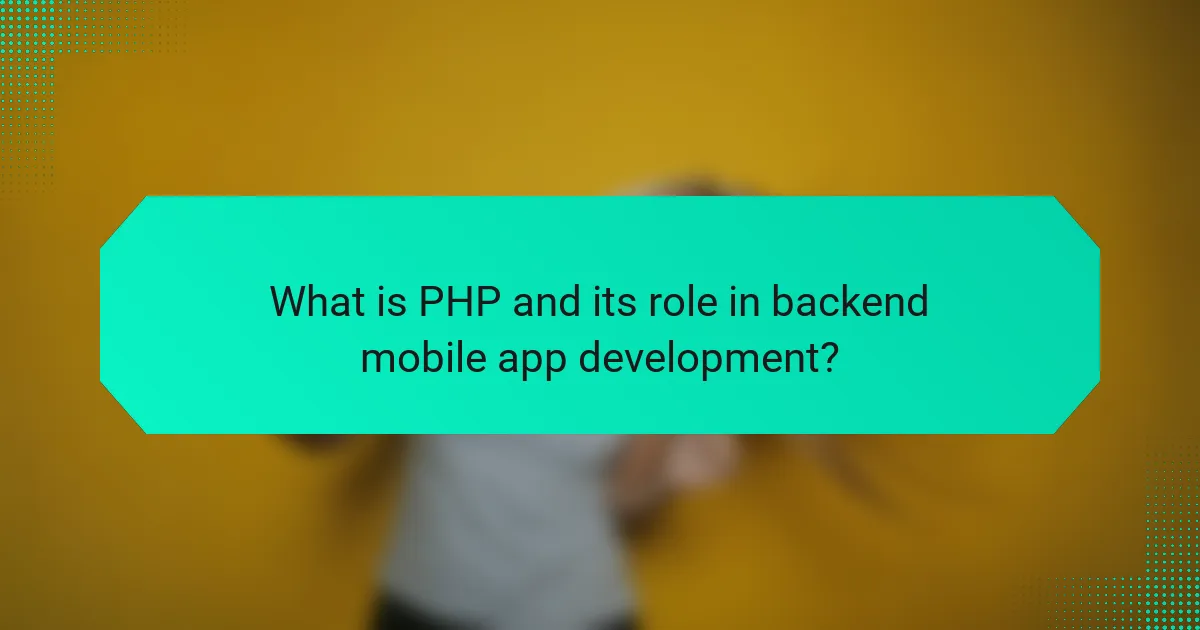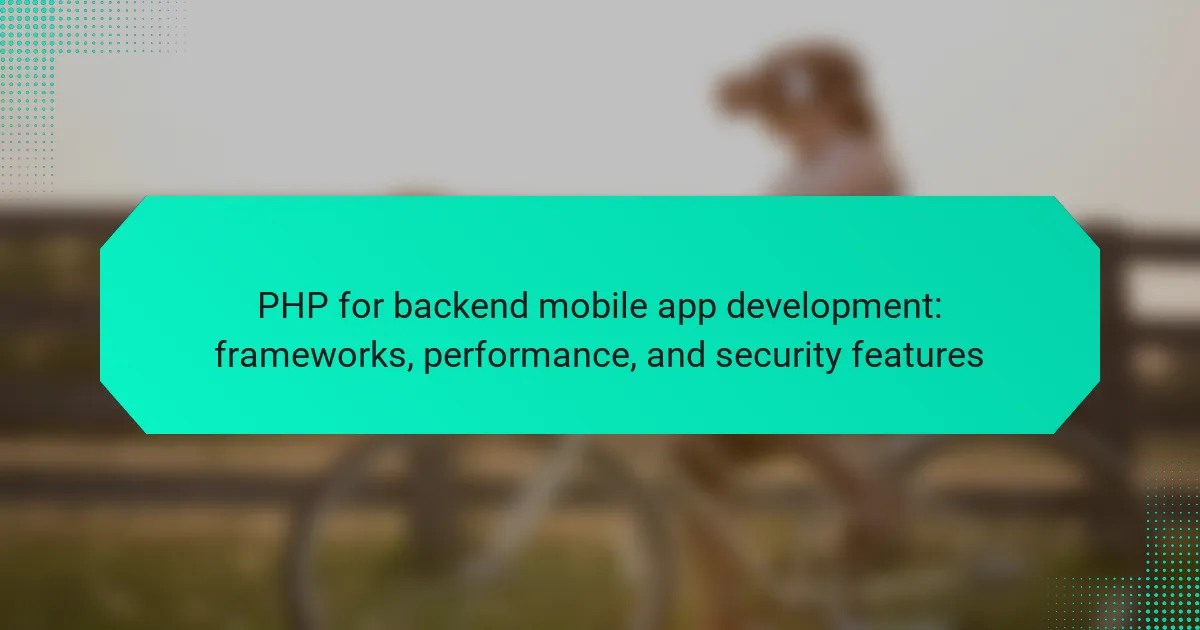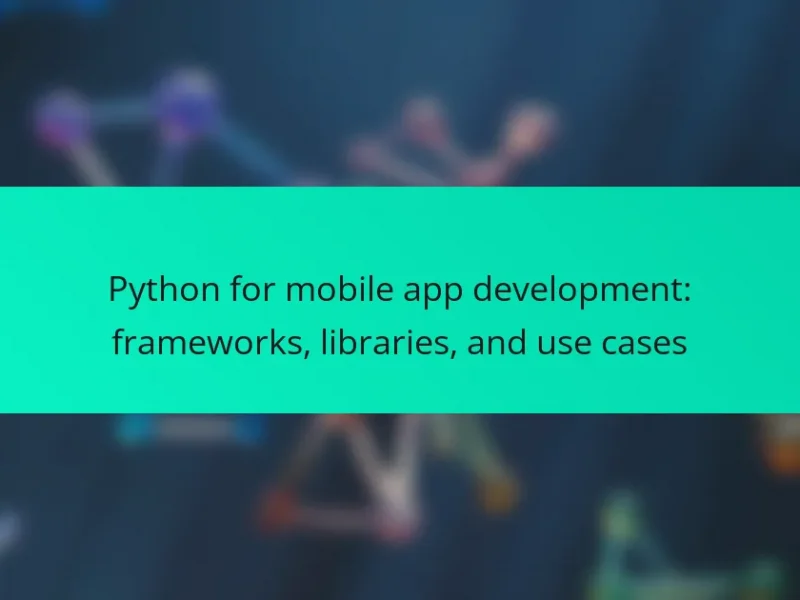PHP is a server-side scripting language extensively used in web and backend mobile app development. This article explores PHP’s frameworks, such as Laravel and Symfony, which enhance development efficiency and streamline processes. It highlights PHP’s capabilities in managing data processing, user authentication, and API integration, ensuring robust backend functionality. Additionally, the article discusses PHP’s performance metrics and security features, underlining its significance in powering over 79% of websites that utilize server-side languages. The content aims to provide a comprehensive understanding of PHP’s role in backend mobile app development, focusing on its effectiveness and reliability.

What is PHP and its role in backend mobile app development?
PHP is a server-side scripting language primarily used for web development. It is widely utilized in backend mobile app development to handle data processing and server interactions. PHP enables developers to create dynamic content and manage databases efficiently. It supports various frameworks like Laravel and Symfony, which streamline development processes. PHP’s role includes managing user authentication, data storage, and API integration. According to W3Techs, PHP powers over 79% of websites with known server-side languages, showcasing its popularity and reliability. This widespread adoption indicates its effectiveness in backend applications, including mobile services.
How does PHP interact with mobile applications?
PHP interacts with mobile applications primarily through server-side scripting. Mobile applications often require a backend to manage data and business logic. PHP serves as a backend language that handles requests from mobile apps. When a mobile app sends a request, PHP processes it on the server. PHP can retrieve data from databases and send responses back to the mobile app. This interaction typically occurs via APIs, often using RESTful services. PHP frameworks like Laravel and Symfony facilitate the creation of these APIs. They provide tools to streamline development and enhance performance. PHP’s ability to handle multiple requests simultaneously supports efficient mobile app performance.
What are the key features of PHP that support mobile app backend development?
PHP supports mobile app backend development through several key features. It offers robust performance due to its efficient memory management and execution speed. PHP is widely supported by various frameworks like Laravel and Symfony, which streamline development processes. It also provides extensive libraries and tools that enhance functionality. PHP’s ability to integrate easily with databases, such as MySQL, ensures effective data management. Security features, including built-in functions for data sanitization, help protect against common vulnerabilities. Additionally, PHP’s active community contributes to ongoing improvements and support. These attributes make PHP a suitable choice for mobile app backend development.
How does PHP’s architecture influence mobile app performance?
PHP’s architecture influences mobile app performance primarily through its server-side processing capabilities. PHP operates on a request-response model, where scripts are executed on the server before sending the output to the client. This architecture allows for efficient handling of database interactions and business logic, which can significantly enhance performance.
The use of frameworks like Laravel or Symfony can further optimize performance by providing built-in caching mechanisms. Caching reduces the load on the server by storing frequently accessed data. Additionally, PHP’s ability to integrate with various databases allows for optimized data retrieval, which is crucial for mobile applications that require quick access to information.
Moreover, PHP’s asynchronous programming capabilities, introduced in newer versions, can improve performance by allowing multiple tasks to run concurrently. This is particularly beneficial for mobile apps that rely on real-time data updates.
Overall, PHP’s architecture, characterized by its server-side execution, use of frameworks, and support for asynchronous programming, directly contributes to the performance of mobile applications.
What are the most popular PHP frameworks for mobile app development?
Laravel, Symfony, and CodeIgniter are the most popular PHP frameworks for mobile app development. Laravel is known for its elegant syntax and robust features. It offers built-in support for RESTful APIs, making it ideal for mobile applications. Symfony provides a flexible architecture and reusable components, enhancing development efficiency. CodeIgniter is lightweight and easy to set up, suitable for smaller projects. According to the 2023 Stack Overflow Developer Survey, Laravel remains the most loved PHP framework among developers.
What are the strengths and weaknesses of Laravel for mobile backends?
Laravel’s strengths for mobile backends include its elegant syntax, robust routing, and built-in security features. It provides a powerful ORM called Eloquent, which simplifies database interactions. Laravel also supports RESTful API development, making it suitable for mobile applications. Additionally, its extensive ecosystem includes packages for various functionalities, enhancing development speed.
Weaknesses of Laravel for mobile backends include its performance overhead compared to micro-frameworks. The framework can be resource-intensive, which may affect response times under heavy load. Laravel’s learning curve can be steep for beginners, potentially slowing down initial development. Lastly, its reliance on server-side rendering may not be optimal for applications requiring high interactivity.
How does Symfony compare to other PHP frameworks for mobile applications?
Symfony offers robust features for mobile application development, making it competitive with other PHP frameworks. It excels in scalability, which is crucial for mobile apps that may experience variable traffic. Symfony’s modular architecture allows developers to use only the components they need, enhancing performance.
In terms of security, Symfony provides built-in protection against common vulnerabilities like SQL injection and cross-site request forgery. This is essential for mobile applications that handle sensitive user data. Additionally, Symfony’s extensive documentation and community support facilitate quicker development and troubleshooting.
Compared to frameworks like Laravel, Symfony is often seen as more complex but offers greater flexibility and control. Laravel, while user-friendly, may not match Symfony’s performance in large-scale applications. Overall, Symfony stands out in mobile app development for its architecture, security features, and scalability.
What performance considerations should be taken into account when using PHP?
Performance considerations when using PHP include optimizing code efficiency, managing memory usage, and utilizing caching mechanisms. Efficient code reduces execution time and resource consumption. Memory management is crucial as PHP can consume significant memory, especially with large applications. Caching, such as opcode caching with tools like OPcache, can significantly enhance performance by storing precompiled script bytecode in memory. Additionally, using a PHP framework that emphasizes performance, such as Laravel or Symfony, can streamline development and improve application speed. Database interactions should also be optimized; using prepared statements and indexing can reduce query times. Lastly, minimizing the use of external libraries and keeping dependencies light can further enhance PHP application performance.
How can caching improve PHP performance in mobile app backends?
Caching can significantly improve PHP performance in mobile app backends by reducing server load and response times. By storing frequently accessed data, caching minimizes the need for repeated database queries. This leads to faster data retrieval, which enhances user experience.
For example, using tools like Redis or Memcached allows PHP applications to cache data in memory. According to studies, implementing caching can reduce response times by up to 90%. This efficiency is crucial for mobile applications that require quick interactions.
Furthermore, caching decreases the overall server resource consumption. With fewer database calls, the server can handle more simultaneous users. This scalability is vital for mobile apps experiencing high traffic.
In summary, caching optimizes PHP performance by speeding up data access and reducing server strain, contributing to a smoother mobile app experience.
What are the best practices for optimizing PHP code for mobile applications?
To optimize PHP code for mobile applications, focus on efficient coding practices. Use lightweight frameworks to reduce overhead and improve performance. Minimize database queries to decrease load times. Implement caching strategies to store frequently accessed data. Optimize images and assets to enhance loading speed. Use asynchronous processing for long-running tasks to prevent blocking. Validate and sanitize user inputs to enhance security. Finally, conduct regular performance testing to identify and resolve bottlenecks. These practices lead to faster, more responsive mobile applications.
How does security play a role in PHP for mobile app backends?
Security is crucial in PHP for mobile app backends as it protects sensitive data and ensures safe interactions. PHP provides various security features like input validation, output encoding, and session management. These features help prevent common vulnerabilities such as SQL injection and cross-site scripting (XSS). Additionally, PHP frameworks often include built-in security mechanisms to streamline development. For example, Laravel provides CSRF protection and password hashing out of the box. Implementing HTTPS is also essential for encrypting data in transit. According to the OWASP Top Ten, securing APIs is vital for preventing unauthorized access. Thus, PHP’s security capabilities are fundamental for safeguarding mobile app backends.
What common security vulnerabilities should developers be aware of?
Common security vulnerabilities developers should be aware of include SQL injection, cross-site scripting (XSS), and cross-site request forgery (CSRF). SQL injection occurs when attackers manipulate SQL queries to gain unauthorized access to databases. XSS allows attackers to inject malicious scripts into web pages viewed by users. CSRF tricks users into executing unwanted actions on web applications in which they are authenticated. According to the OWASP Top Ten, these vulnerabilities are prevalent and can lead to severe data breaches. Awareness and mitigation strategies are crucial for secure PHP backend development.
How can developers implement security measures in PHP applications?
Developers can implement security measures in PHP applications by following best practices. They should use prepared statements to prevent SQL injection attacks. Input validation is essential to ensure that only expected data is processed. Developers must also implement proper error handling to avoid exposing sensitive information. Using HTTPS encrypts data transmitted between the client and server, enhancing security. Regularly updating PHP and its libraries is crucial to patch known vulnerabilities. Implementing session management techniques can help prevent session hijacking. Finally, developers should use security libraries and frameworks that provide built-in protections. These practices collectively strengthen the security posture of PHP applications.
What are the best practices for PHP backend development in mobile apps?
The best practices for PHP backend development in mobile apps include using a framework, optimizing performance, and ensuring security. Frameworks like Laravel or Symfony streamline development and provide built-in features. Performance optimization involves using caching techniques and minimizing database queries. Implementing secure coding practices protects against vulnerabilities. Regularly updating PHP and libraries ensures access to the latest security patches. Employing RESTful APIs enhances communication between the mobile app and backend. Proper error handling improves user experience and debugging. Finally, conducting thorough testing guarantees reliability and performance.
How can developers ensure maintainability and scalability in PHP projects?
Developers can ensure maintainability and scalability in PHP projects by following best practices in coding and architecture. They should implement a modular design to separate concerns and enhance code reusability. Adopting a version control system, like Git, allows for tracking changes and collaboration. Utilizing frameworks such as Laravel or Symfony promotes structured code and standard practices. Regular code reviews help identify potential issues early. Writing unit tests ensures that code changes do not introduce new bugs. Documentation of code and processes aids in onboarding new developers and maintaining clarity. According to a study by the International Journal of Advanced Computer Science and Applications, structured coding practices significantly improve maintainability and scalability in software projects.
What tools can assist in debugging and optimizing PHP applications?
Xdebug is a powerful tool for debugging PHP applications. It provides stack traces and function traces in error messages. This allows developers to identify issues quickly. Additionally, Xdebug supports remote debugging. This feature enables real-time code analysis.
PHPStan is another tool that assists in optimizing PHP applications. It performs static analysis to detect potential bugs. PHPStan helps ensure code quality before runtime.
Blackfire is useful for performance profiling. It provides insights into application performance metrics. Developers can identify bottlenecks and optimize resource usage.
Finally, Composer aids in managing dependencies effectively. It ensures that libraries are up to date. This reduces compatibility issues and enhances performance. These tools collectively improve the debugging and optimization processes for PHP applications.
What resources are available for learning PHP in the context of mobile app development?
Online platforms like Udemy and Coursera offer courses specifically focused on PHP for mobile app development. These courses cover frameworks such as Laravel and Symfony, which are essential for backend development. Books like “PHP for Mobile App Development” provide in-depth knowledge and practical examples. Additionally, PHP documentation is a critical resource for understanding core concepts and functions. Forums like Stack Overflow allow for community support and troubleshooting. GitHub repositories often contain sample projects that demonstrate PHP’s application in mobile contexts. YouTube channels dedicated to programming also offer tutorials on PHP for mobile apps. These resources collectively provide a comprehensive learning experience for PHP in mobile app development.
What online courses or tutorials are recommended for PHP beginners?
Online courses recommended for PHP beginners include “PHP for Beginners” on Udemy and “Learn PHP” on Codecademy. These platforms offer structured content for foundational learning. Udemy’s course features over 22 hours of video content and hands-on projects. Codecademy provides interactive lessons and quizzes to reinforce learning. Both courses cover essential PHP concepts and syntax. They are well-reviewed and cater to absolute beginners. This makes them suitable for those starting their journey in PHP development.
How can community forums and documentation aid in PHP development?
Community forums and documentation significantly aid in PHP development by providing essential resources and support. Forums allow developers to ask questions and share knowledge. This interaction fosters a collaborative environment where solutions can be quickly found. Documentation offers detailed guidelines on PHP functions and best practices. It serves as a reference point for both beginners and advanced users. The PHP manual, for example, is comprehensive and regularly updated. This ensures that developers have access to the latest information. Additionally, community contributions enhance documentation quality. User-generated content often addresses real-world issues not covered in official resources. This combination of forums and documentation accelerates problem-solving and skill development in PHP.
PHP is a server-side scripting language essential for backend mobile app development, facilitating data processing, server interactions, and API integration. The article explores PHP’s role, key features, and popular frameworks like Laravel and Symfony, highlighting their impact on performance and security. It addresses performance optimization strategies, caching techniques, and security measures necessary to safeguard mobile applications. Additionally, it outlines best practices for maintainability and scalability, alongside resources for learning PHP in the context of mobile development.


